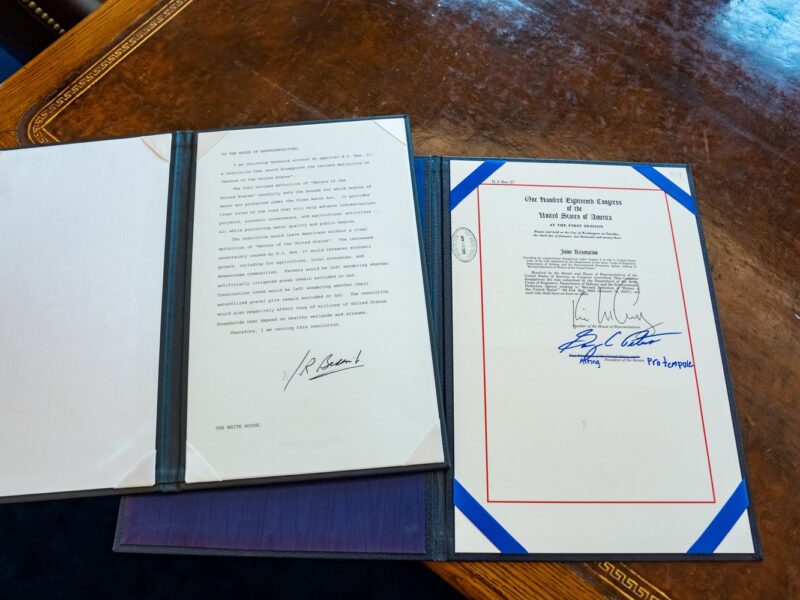Republicans Fail to Override Biden’s Veto of EPA Water Regulation Rollbacks Championed by Wyoming Delegation
Wyoming leaders have decried the regulations as ‘problematic’ and ‘government imposed wretchedness’
- Published In: Politics
- Last Updated: Apr 20, 2023

House Republicans failed to override President Joe Biden's veto of their resolution seeking to block the White House from enforcing a new rule granting the EPA broad authority to regulate American waterways. (Photo via Twitter / President Joe Biden)
By Jacob Gardenswartz
Special to the Wyoming Truth
WASHINGTON — Republicans in the U.S. House of Representatives tried and failed to override President Joe Biden’s veto of a resolution which would have rolled back an Environmental Protection Agency (EPA) water rule seen as a keystone of his administration’s climate agenda.
Despite the GOP House majority, those seeking to enforce the regulation fell short of the two-thirds threshold required to override a presidential veto on Tuesday. The 227-196 vote broke primarily along partisan lines, with 10 Democrats joining most Republicans in favor of the override, and one Republican voting with the remaining Democrats to oppose it.
“The Biden Administration and House Democrats once again have failed the American people with their unconstitutional regulations,” Rep. Harriet Hageman (R-Wyo.) told the Wyoming Truth in a statement Wednesday morning following the failed vote. “I will continue fighting to stop this government imposed wretchedness as Wyoming’s lone member of Congress.”
What qualifies as U.S. water?
At issue is a decades-old dispute over how much authority the federal government has to regulate pollution in waterways and wetlands. The 1972 Clean Water Act allows the EPA to regulate “waters of the United States” (WOTUS), but despite multiple court battles about what that definition entails, significant questions remain over which bodies should be defined as such.
In 2015, then-President Barack Obama’s administration proposed a new rule expanding the definition to encompass more bodies of water, including tributaries that “impact the health of downstream waters,” streams and ditches that “function” like them. The Trump administration in 2020 rolled back the rule to ease the regulations, but Biden’s EPA announced intentions to reinstate them late last year.
The expanded definition has repeatedly come under fire from all members of Wyoming’s congressional delegation and other state leaders.
Hageman co-sponsored the House resolution to nullify Biden’s rule whose purpose, she alleged, is “to effectively steal private property from Wyoming’s ranchers, farmers, energy producers and others.” Both Sens. John Barrasso and Cynthia Lummis backed the Senate version of the resolution, which under the Congressional Review Act required just a simple majority to pass. With the support of all Republicans and several Democrats seen as vulnerable in the 2024 elections, the measure easily cleared that threshold.
“Wyoming doesn’t need the federal government telling us what to do with our water, farms, ranches, and land,” Barrasso said in a statement at the time. “President Biden needs to put hardworking Americans first and keep this rule buried in the past.”
“I’m proud to vote to protect Wyoming landowners from this clear overreach, and to protect our water, one of our most valuable resources, without overbearing regulations from the federal government,” echoed Lummis.
At the state level, Gov. Mark Gordon joined a January joint letter signed by 24 additional GOP governors calling on Biden to delay implementation of the rule, and later led the state into a lawsuit against the EPA and the U.S. Army Corps of Engineers seeking to have the rule struck down in the courts.
But despite bipartisan votes and outreach from state leaders seeking to overturn his policy, Biden has held firm, blocking the legislative attempts to overturn it with a presidential veto on April 6 — only his second such action since taking office.
“Let me be clear: Every American has a right to clean water,” he said at the time. In a statement of administrative policy accompanying Biden’s veto message, the White House wrote the resolution “would leave Americans without a clear definition of ‘Waters of the United States,’” claiming the measure would lead to “increased uncertainty” and “threaten economic growth.”
Court halts enforcement in Wyoming, as Supreme Court set to rule
As legislators and state leaders war with the White House over the water rule, judges are similarly scrutinizing its constitutionality.
Last week, a federal judge sided with Wyoming and 23 other states which had sued to halt the WOTUS rule, temporarily enjoining enforcement in those states. All told, the rule is now on hold in 26 states; Texas and Idaho had previously received an injunction from a separate judge.
“There is not a mere possibility the new regulations will impact the states – it is a given,” wrote Judge Daniel L. Hovland of the District of North Dakota in an April 12 ruling. “The irreparable harm to the states that occurs with the implementation of the new 2023 rule is clear and undisputed.”
Meanwhile, as that case continues to make its way through the legal system, another matter pending before the U.S. Supreme Court could settle the WOTUS rule issue once-and-for-all.
In Sackett v. EPA, the justices may rule definitively on whether wetlands are “waters of the United States,” or at least define a test to determine how to handle these questions. In arguments thus far, the court’s conservative majority has signaled skepticisms towards the Biden administration’s belief in the EPA’s broad authority to regulate wetland pollution, hinting they may soon move to limit those powers. Environmentalists, in turn, have expressed fears such a ruling could drastically impact government oversight of American waterways.
But Hageman, for her part, has projected optimism about the case’s outcome. “It is my hope that the current Supreme Court case Sackett vs. EPA will rectify this,” she told the Wyoming Truth after the failed veto override vote.













